
Ayn Rand: In Film and On Stage
To the extent that efforts to trace copyright holders may have been unsuccessful, the Ayn Rand Archives welcomes notification of existing rights and terms of use.
Ayn Rand’s career in the film industry included work as a movie extra, a studio wardrobe employee, a reader at RKO, MGM, and Paramount, and eventually, as a contract screenwriter. Rand undertook several projects for the screen and stage, some of which went into production and some that were unrealized visions. This exhibit examines Ayn Rand’s career in film and theater, from her early Hollywood experiences to her later work on film and television adaptations for Atlas Shrugged.
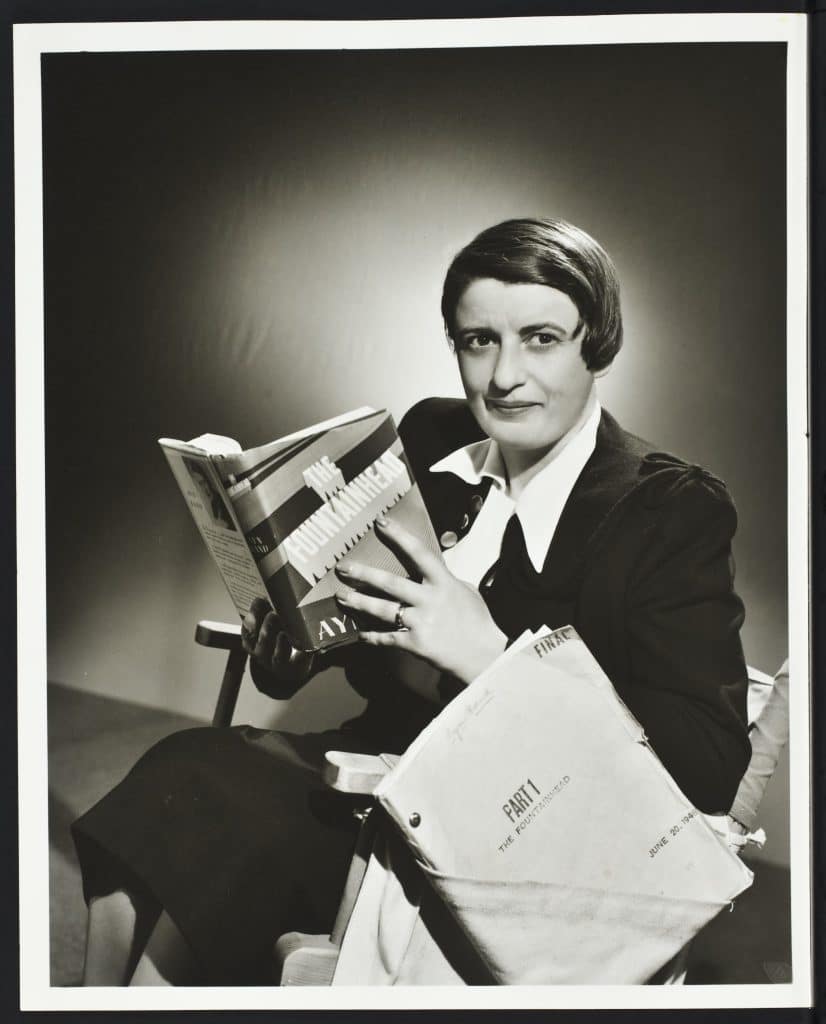
PHOTOGRAPH
ca. 1948
Ayn Rand on the set of The Fountainhead film
Photograph by Jack Woods
40-184
Ayn Rand Photograph Collection
Ayn Rand Archives
Take this short (14 min.) video tour of the exhibit, then explore the items in more detail below:
Soon after escaping to America in 1926, Ayn Rand was hired by director Cecil B. DeMille as a junior screenwriter. In a composition notebook, Rand imagined her story treatment brought to life on film, with a poster declaring: “Cecil B. DeMille presents The SKYSCRAPER by Ayn Rand: An Epic of Construction.” The hero of her story, Howard Kane, was originally named Francis Gonda, whose name appears on this page of her notes.
To learn more about “The Skyscraper” and its impact on Rand’s life, readers are invited to consult this article by Brandon Lisi.
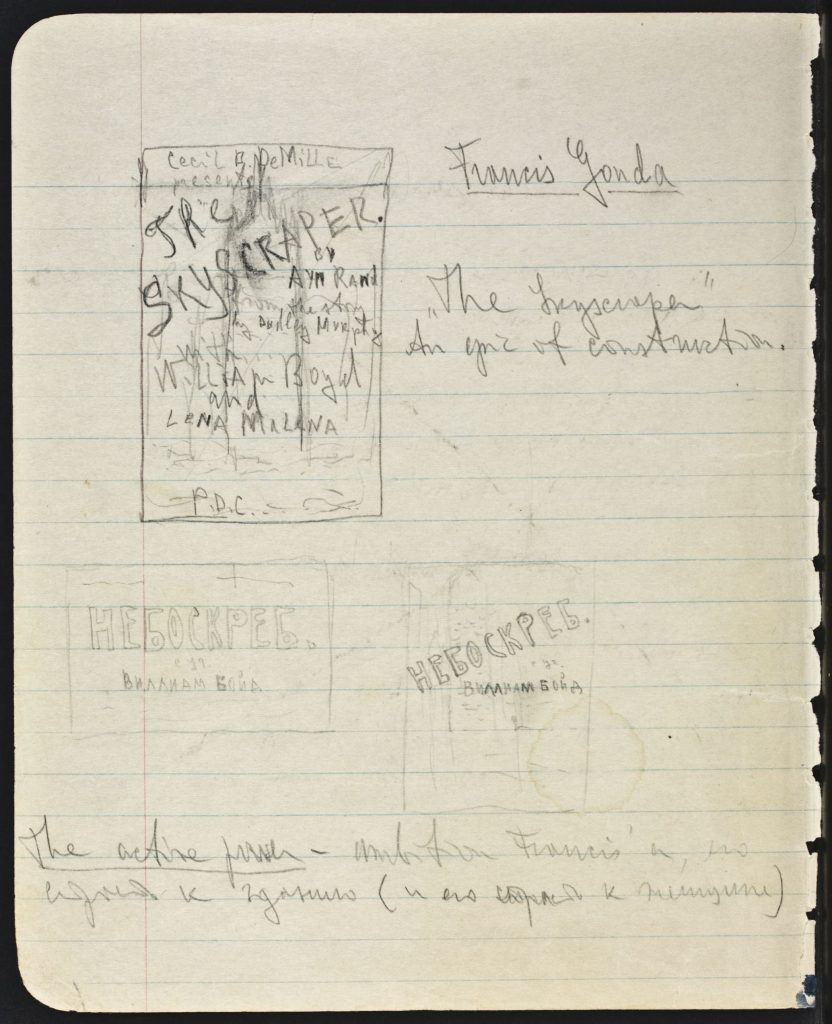
“THE SKYSCRAPER,” DEMILLE NOTEBOOK
1927
This notebook contains Rand’s drafts of story treatments while working for DeMille—one of which was “The Skyscraper,” a story about a young architect who is commissioned to construct one of the highest and most unusual buildings in New York City.
166_03B_001
Ayn Rand Papers
Ayn Rand Archives
PHOTOGRAPH
1928
Portrait of Ayn Rand by Witzel, inscribed to Frank O’Connor: “I can’t ever say more than ‘I love you,’ Frank dearest,—and I love you more than I can ever say.”
20-127
Ayn Rand Photograph Collection
Ayn Rand Archives
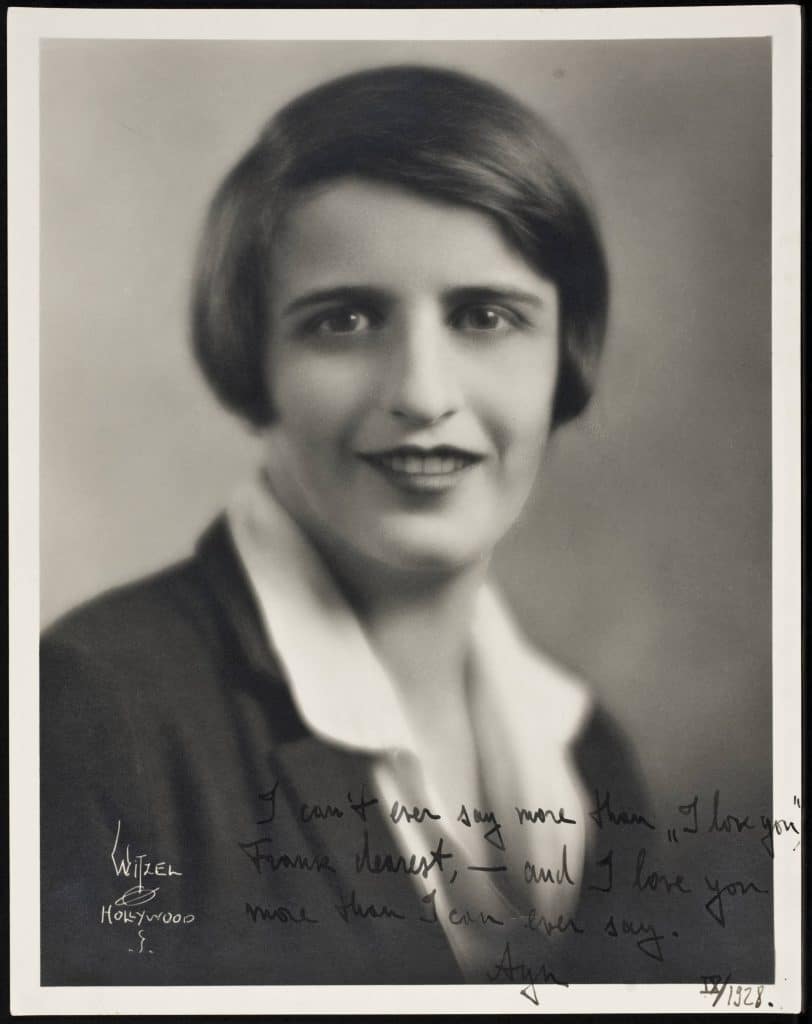
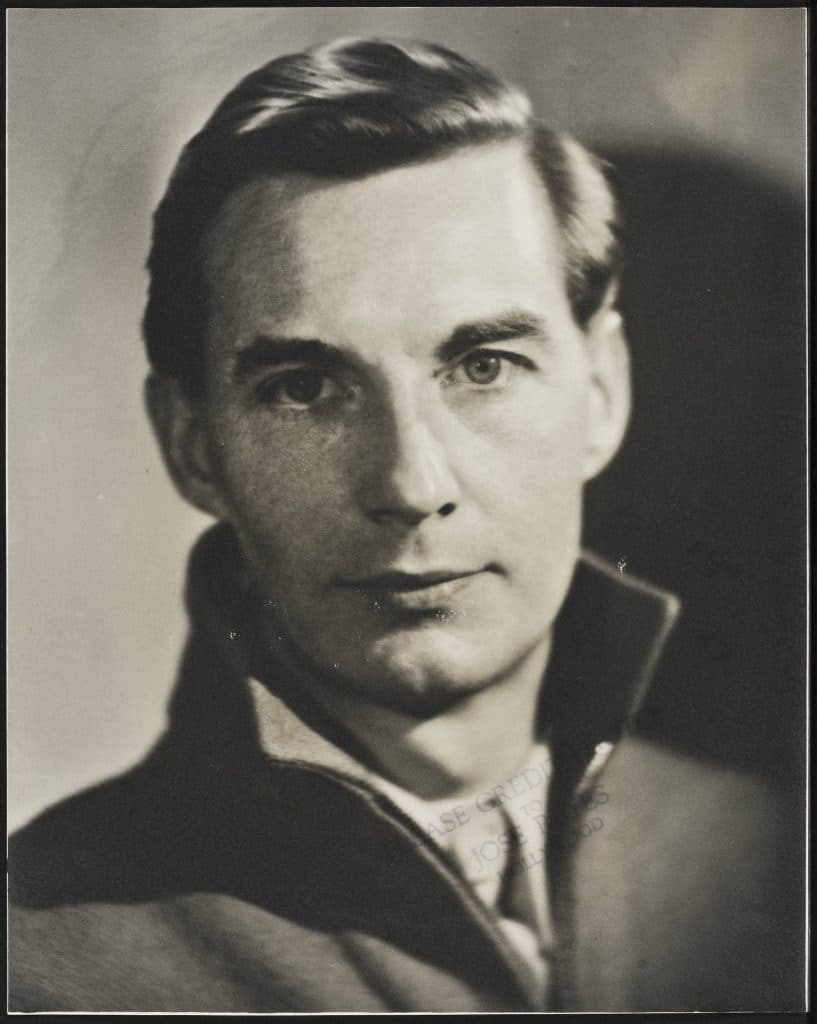
PHOTOGRAPH
ca. 1930s
Portrait of Frank O’Connor by Jose Reyes
30-14A
Ayn Rand Photograph Collection
Ayn Rand Archives
While Ayn Rand was undertaking the ambitious task of writing her first novel, We the Living, she hatched an idea for a stage play, a project that she hoped would be “finished easier and . . . perhaps easier to sell.” Originally titled Penthouse Legend, the play centered around a murder trial and featured a clever twist: a dozen audience members would be selected to serve as jurors, with alternate endings depending on their verdict.
The play, renamed (at the producer’s request) Woman on Trial, opened at the Hollywood Playhouse on October 22, 1934. It was eventually brought to Broadway under another title, Night of January 16th, and ran for 283 performances between 1935 and 1936. Over the next several decades, the play was performed by a variety of amateur and professional productions, both domestically and internationally. Nevertheless, none of these endeavors fully satisfied her, and she noted in the introduction to the play’s 1968 edition that “although it has played all over the world, I feel as if it were a play that has never been produced.”
PHOTOGRAPH
1934
Photograph of Ayn Rand and poster sign for Woman on Trial on the south side of the Hollywood Playhouse
30-113
Ayn Rand Photograph Collection
Ayn Rand Archives
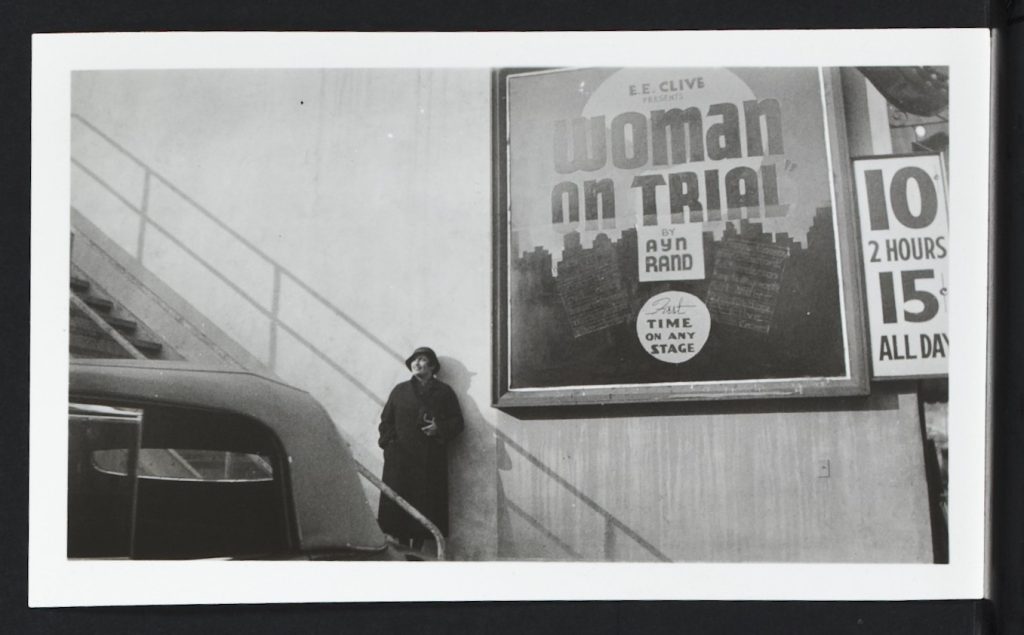
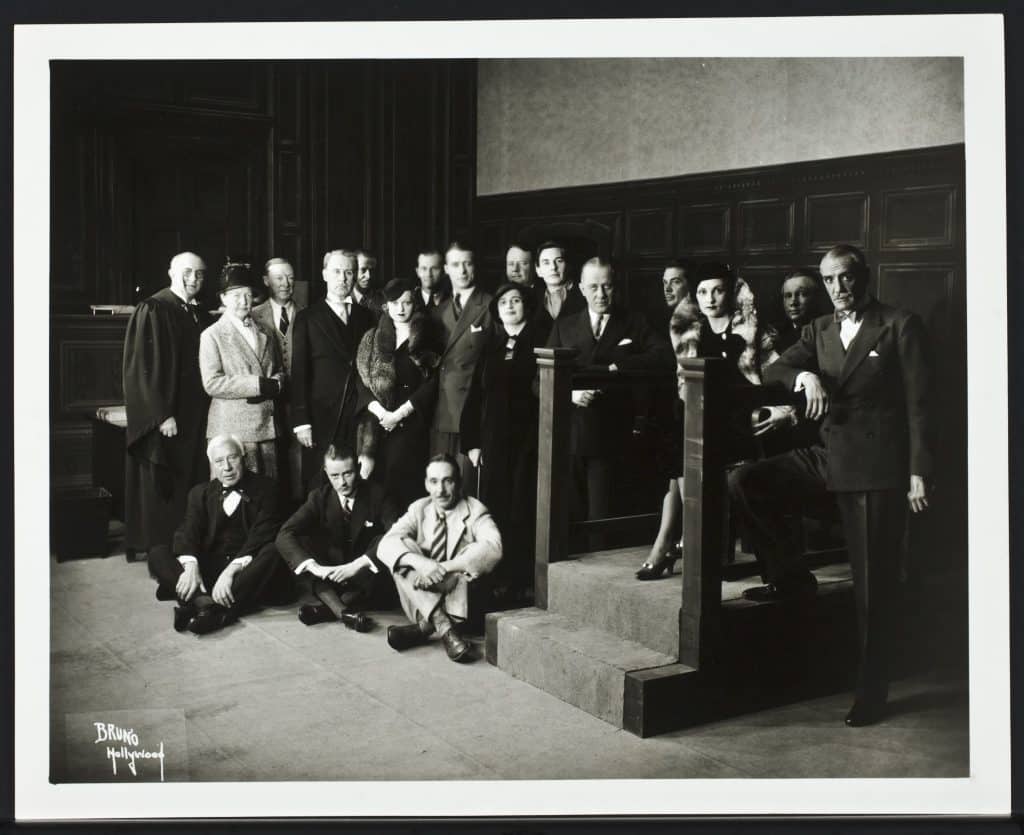
PHOTOGRAPH
1934
Ayn Rand and Frank O’Connor with the cast of Woman on Trial
30-88
Ayn Rand Photograph Collection
Ayn Rand Archives
PHOTOGRAPH
November 10, 1934
Signed photograph of E.E. Clive as Inspector Sweeney, also producer and director of Woman on Trial. The portrait features an inscription to Ayn Rand: “Authoress of a great play. I am proud to have been the producer of ‘Penthouse Legend.'”
30-90
Ayn Rand Photograph Collection
Ayn Rand Archives
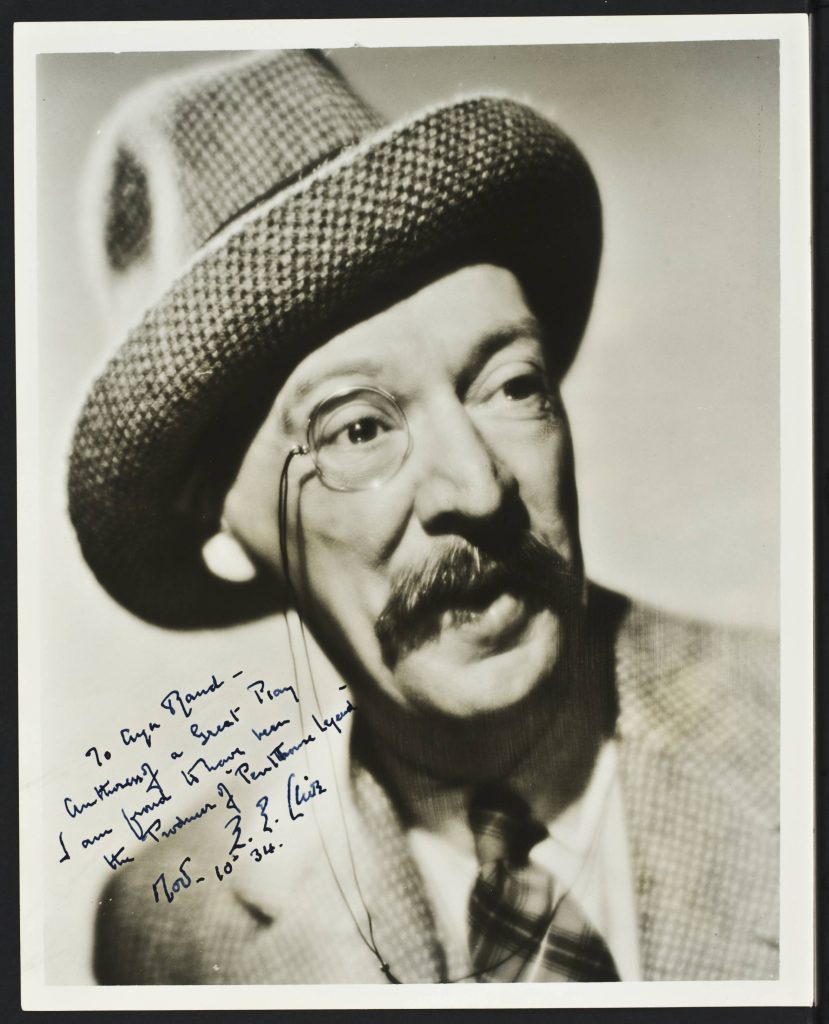
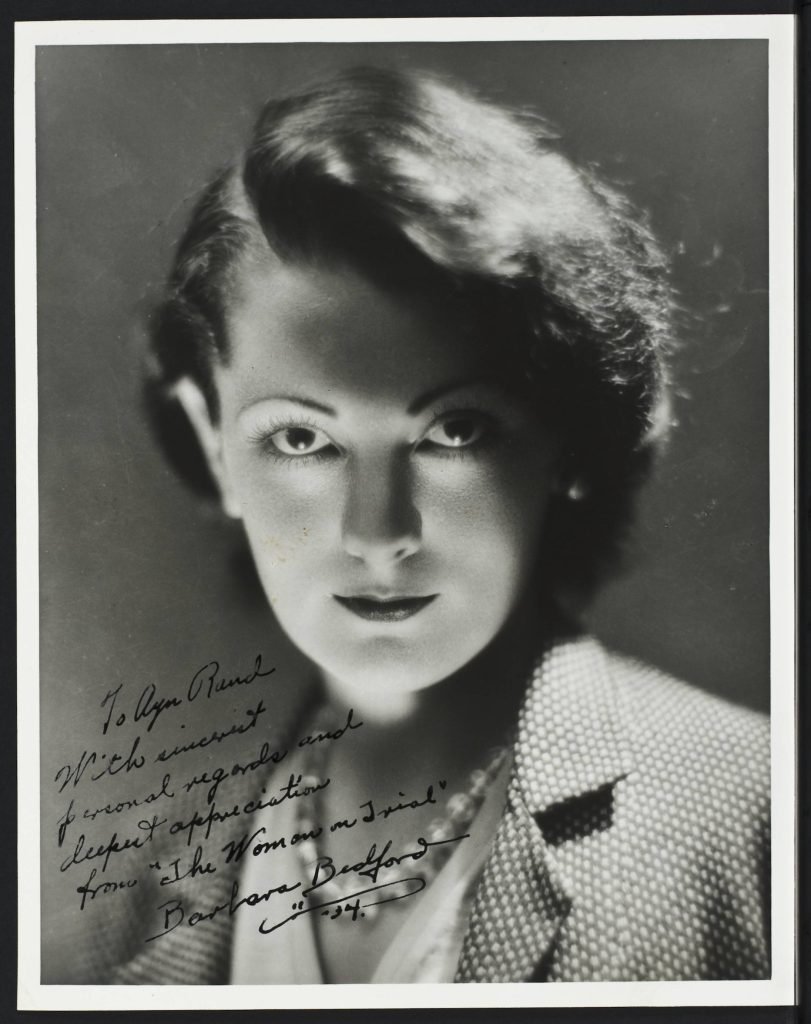
PHOTOGRAPH
1934
Signed photograph of Barbara Bedford as Karen Andre in Woman on Trial featuring an inscription to Ayn Rand: “With sincerest personal regards and deepest appreciation from ‘The Woman On Trial’”
Photograph by Sergis Alberts
30-91
Ayn Rand Photograph Collection
Ayn Rand Archives
PHOTOGRAPH
1937
Photograph of Frank O’Connor with the cast of Night of January 16th at the Stony Creek Theater (Connecticut)
30-151
Ayn Rand Photograph Collection
Ayn Rand Archives
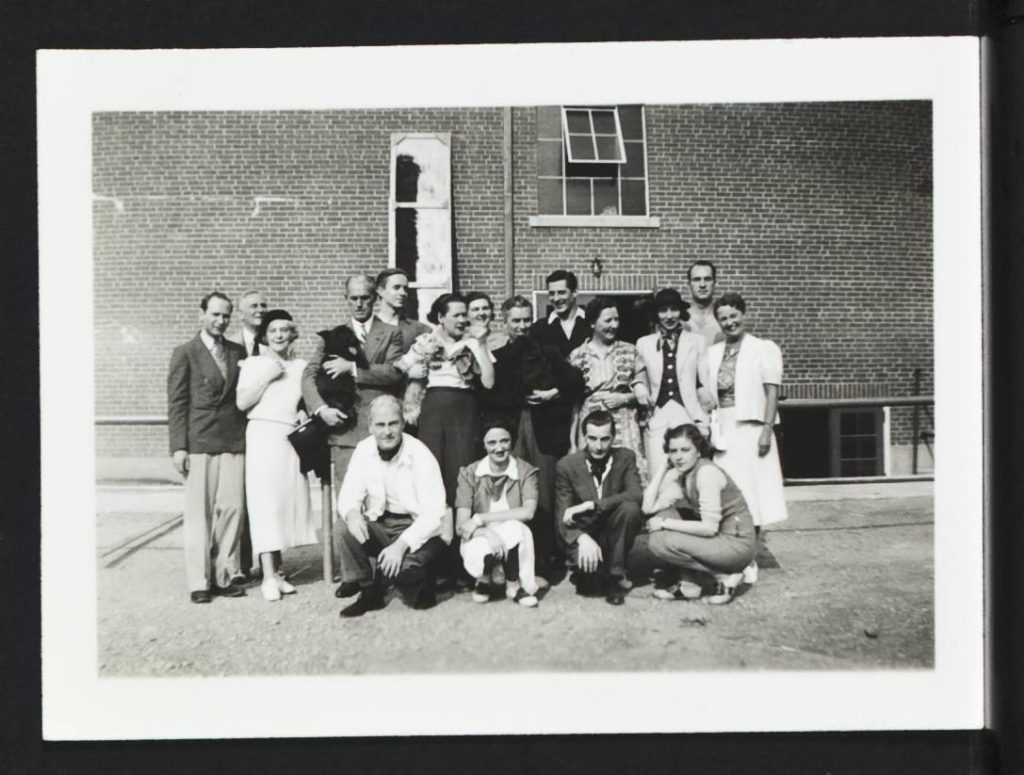
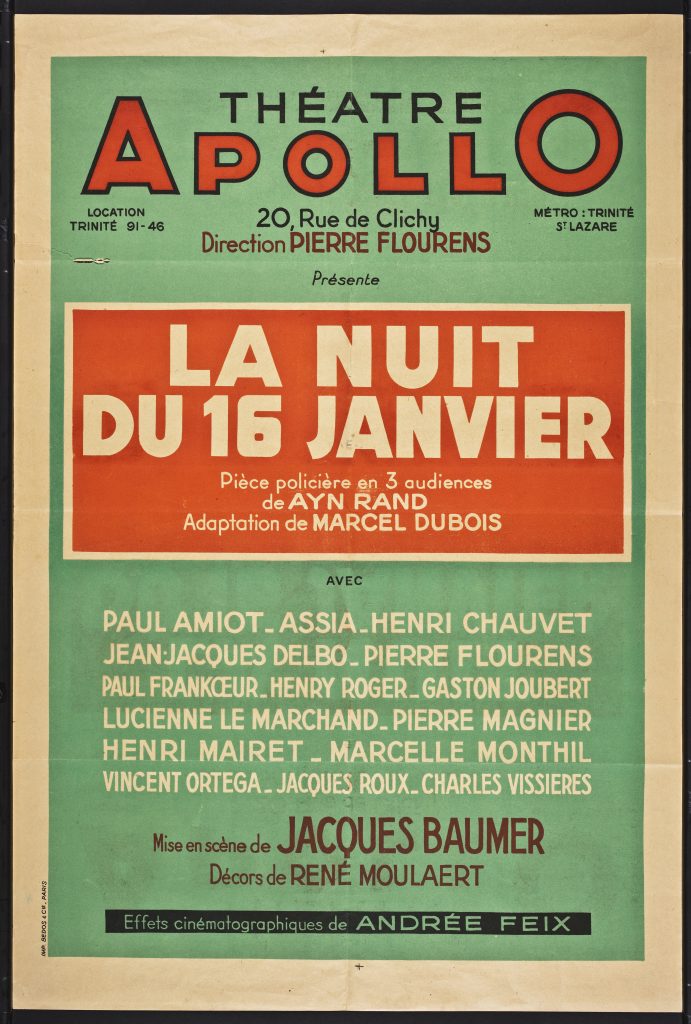
POSTER
No Date
Poster for La Nuit du 16 Janvier (Night of January 16th) at the Apollo Theatre in Paris
053_12x_007
Ayn Rand Papers
Ayn Rand Archives
POSTER
No Date
Ayn Rand’s ticket to see Penthouse Legend at the McAlpin Rooftop Theatre in New York.
009_08x_009
Ayn Rand Papers
Ayn Rand Archives
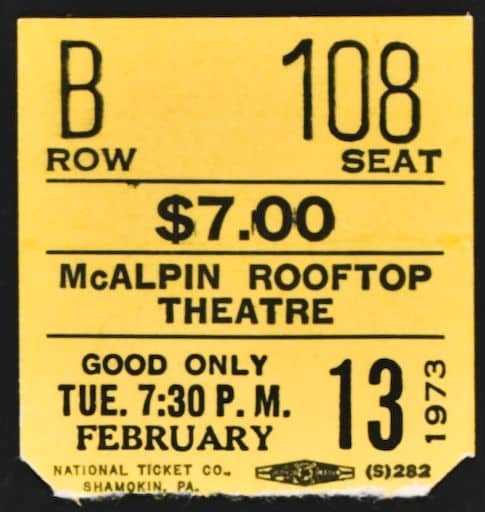
Ayn Rand’s first novel, We the Living, sold three thousand copies in its initial print run, going out of print by the fall of 1937. It wouldn’t be republished in America until more than twenty years later. Hoping to bring renewed attention to the novel, Rand adapted We the Living for the stage. The play opened on Christmas Day 1939 in Baltimore under the title The Unconquered and made its unsuccessful Broadway debut in February 1940, closing after six performances.
In 1942, without Rand’s knowledge or authorization, We the Living was adapted as an Italian motion picture in two parts: Noi Vivi and Addio Kira. Both movies played in theaters for two months and were enormously successful. Unfortunately, both films were pulled from theaters and banned by Italy’s fascist censors. Although every copy was ordered destroyed, the films were secretly preserved, allowing Rand to view them for the first time in 1947. Noi Vivi and Addio Kira are now available as a single film with English subtitles, and the restored 80th anniversary edition is currently playing in select theaters globally.
To learn more about the film and stage adaptations of We the Living, readers are invited to consult this article by Jeff Britting, this lecture by Duncan Scott, and this article by Brandon Lisi.
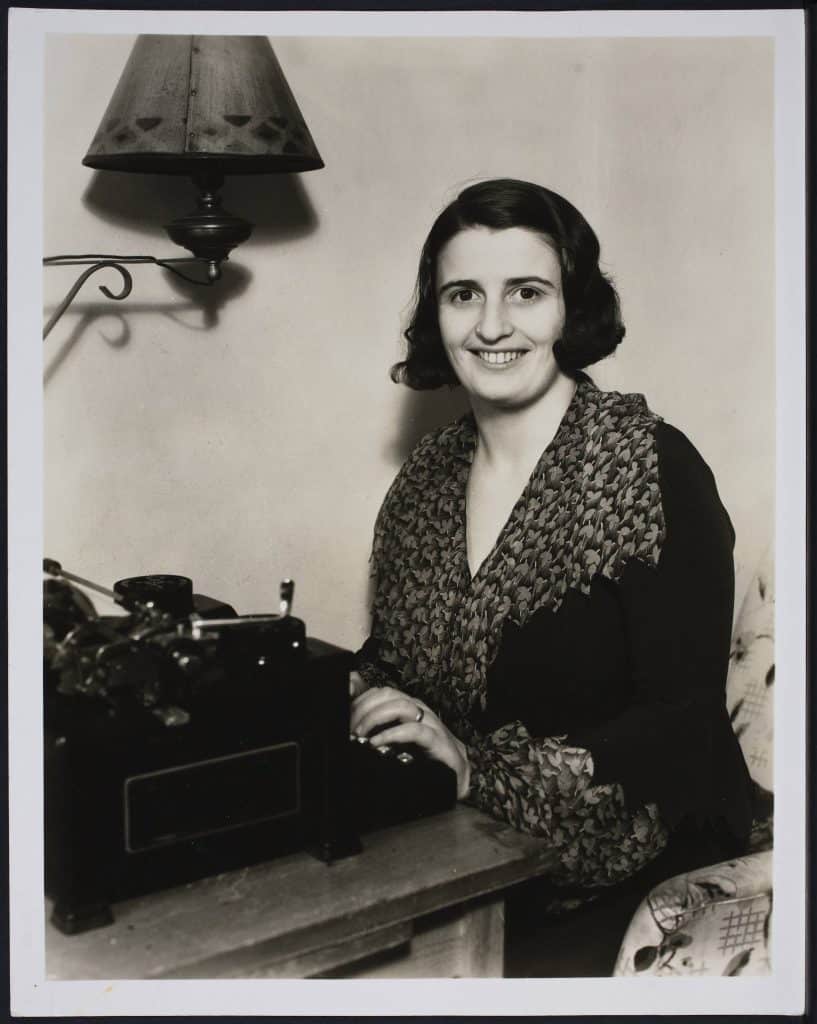
PHOTOGRAPH
ca. 1934
Ayn Rand at typewriter
30-73
Ayn Rand Photograph Collection
Ayn Rand Archives
PLAYBILL
February 13, 1940
Playbill for The Unconquered at the Biltmore Theatre, directed by George Abbott. The cover features John Emery as Leo Kovalensky, Helen Craig as Kira Argounova, and Dean Jagger as Andrei Taganov.
072_06x_004
Ayn Rand Papers
Ayn Rand Archives
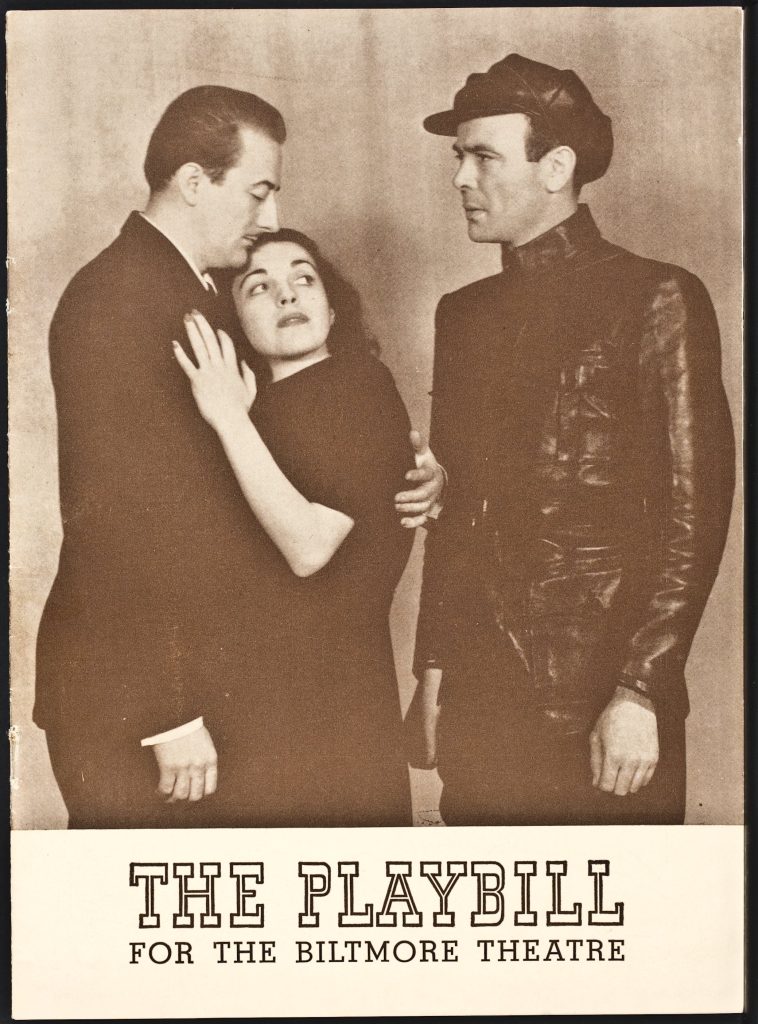
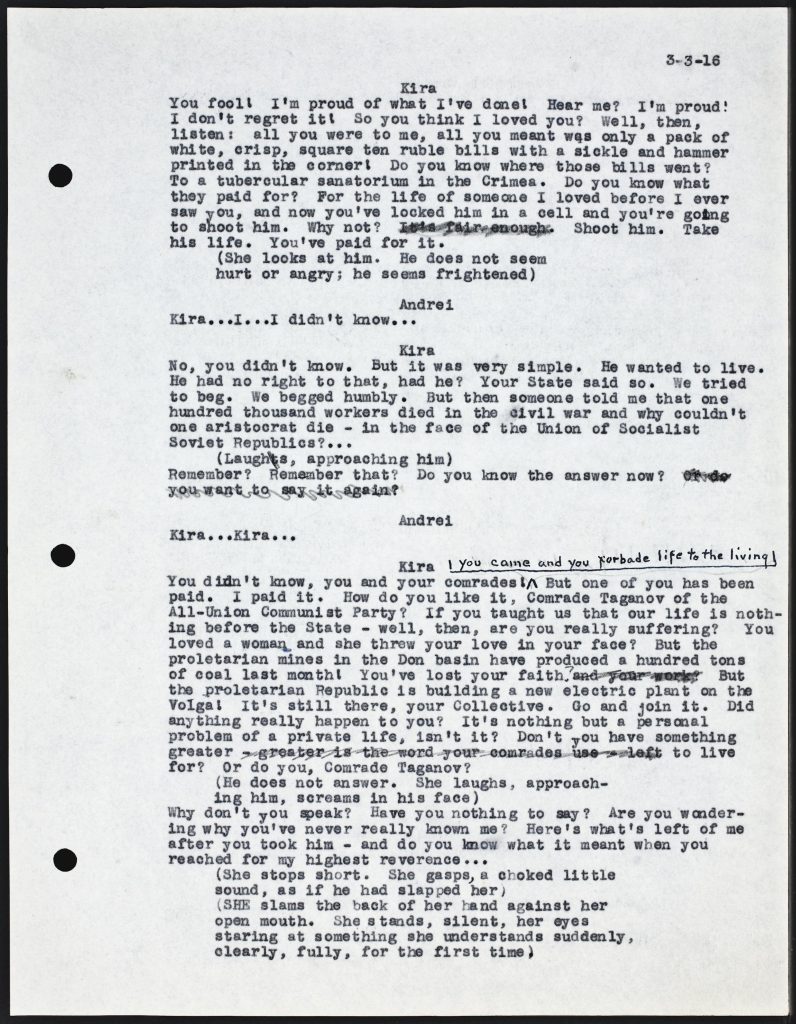
PLAYSCRIPT
ca. 1940
Playscript for the stage adaptation of We the Living (renamed The Unconquered)
076_07x_002
Ayn Rand Papers
Ayn Rand Archives
LETTER TO AYN RAND FROM CESARE GIROSI
April 21, 1947
Ayn Rand received this letter from Cesare Girosi, a representative of Scalera Film, after requesting that she be sent copies of the unauthorized adaptation of We the Living.
128_04B_017
Ayn Rand Papers
Ayn Rand Archives
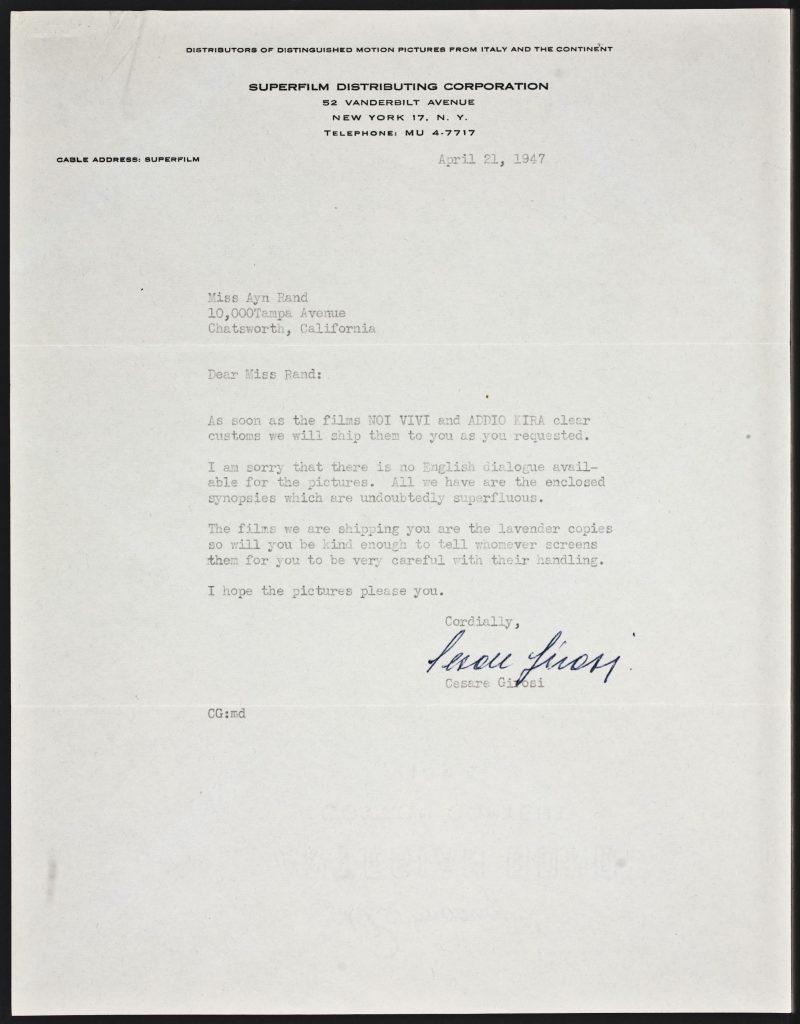
The dramatic turnaround in Rand’s life and career came with the publication of The Fountainhead, her first bestselling novel. Despite initially slow sales, the novel reached Rand’s “kind of readers”—those whom she viewed as “the right minds.” Five months after publication, Warner Brothers purchased the novel’s film rights for $50,000 (nearly a million dollars in today’s money), and Rand was contracted to write the screenplay herself. To be closer to Hollywood, she moved from her New York City apartment to a thirteen-and-a-half-acre estate in the San Fernando Valley.
The following year, Rand signed a contract to write screenplays for producer Hal Wallis. Their deal included an arrangement whereby Rand received six months off every year to work on her own projects. Their collaboration yielded multiple scripts, including two produced films, You Came Along and Love Letters, the latter being nominated for four Academy Awards.
By mutual agreement, Rand and Wallis terminated their deal due to the Hollywood depression of the late 1940s and the increased strain in their working relationship. This allowed Rand to devote all her energy to the project that would become her magnum opus: Atlas Shrugged.
To learn more about Rand’s Hollywood career, readers are invited to consult this article by Jeff Britting (as well as this article about the potential film adaptations of Anthem), this video and this lecture by Shoshana Milgram, and this article by Brandon Lisi.
PHOTOGRAPH
1944
Ayn Rand on the set of The Conspirators with director Jean Negulesco and lead actor Paul Henreid
40-111
Ayn Rand Photograph Collection
Ayn Rand Archives
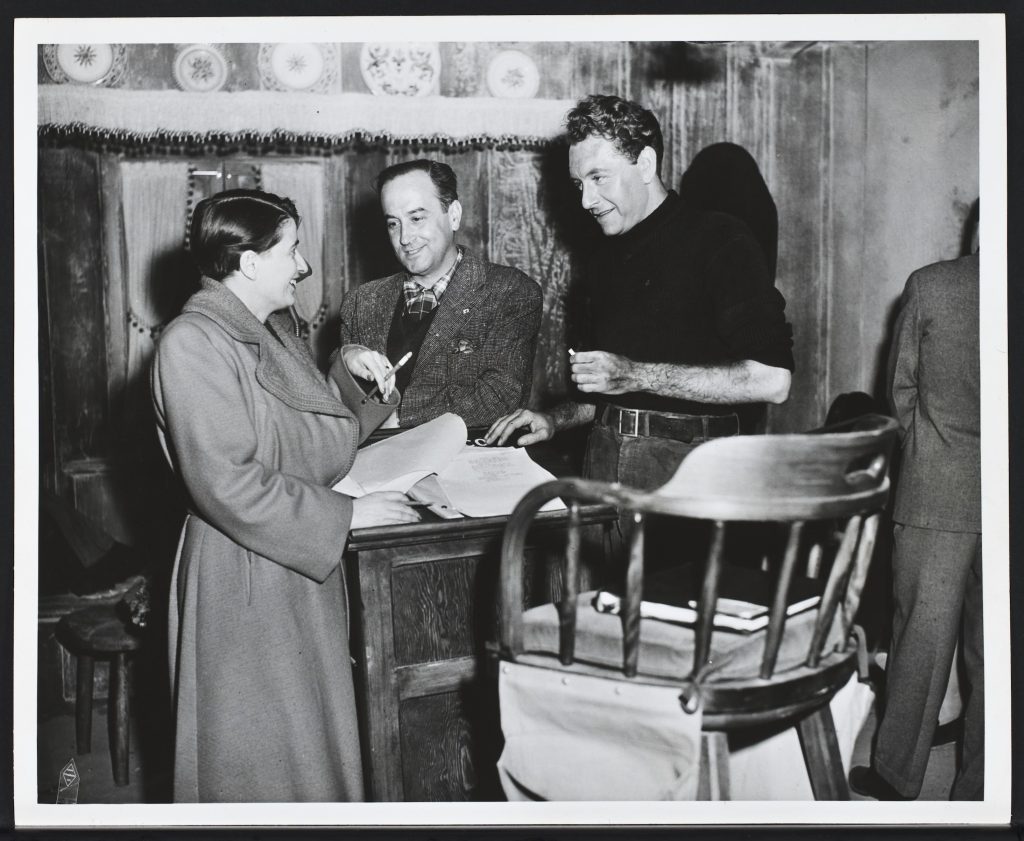
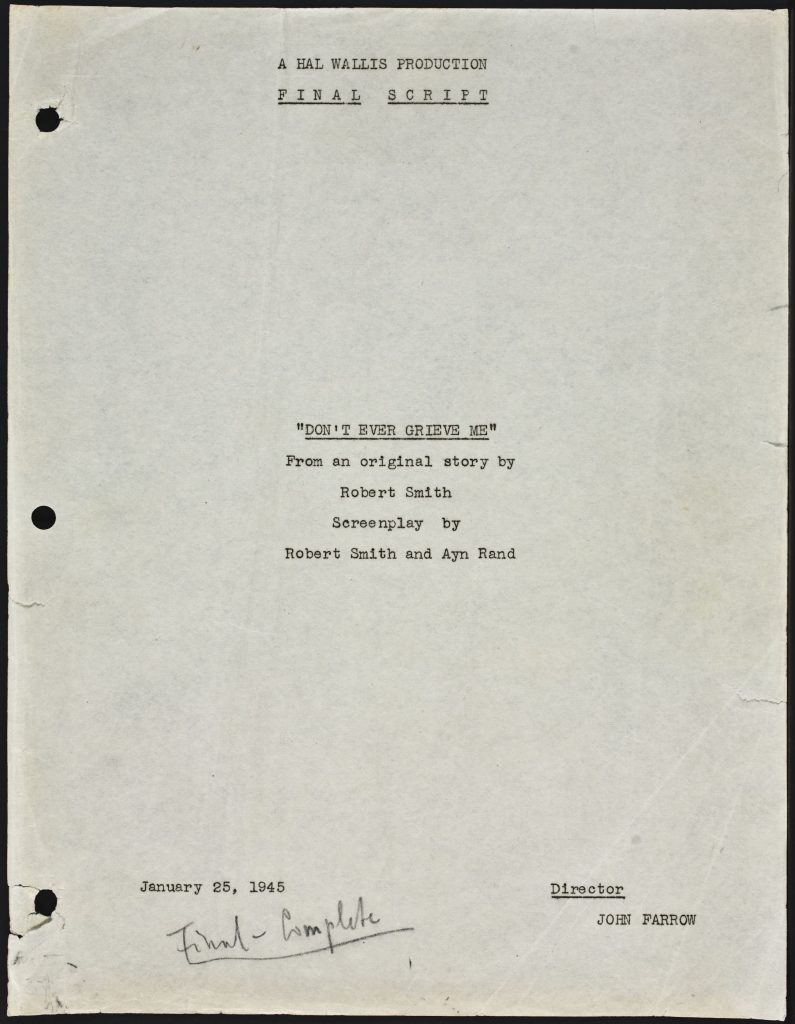
SCREENPLAY
January 25, 1945
Screenplay for “Don’t Ever Grieve Me,” the original title of the film You Came Along
048_07x_001
Ayn Rand Papers
Ayn Rand Archives
SHEET MUSIC
1945
Sheet music for “You Came Along (From Out of Nowhere),” the titular song featured in the 1945 film You Came Along
Ray Shelton Collection
Ayn Rand Archives
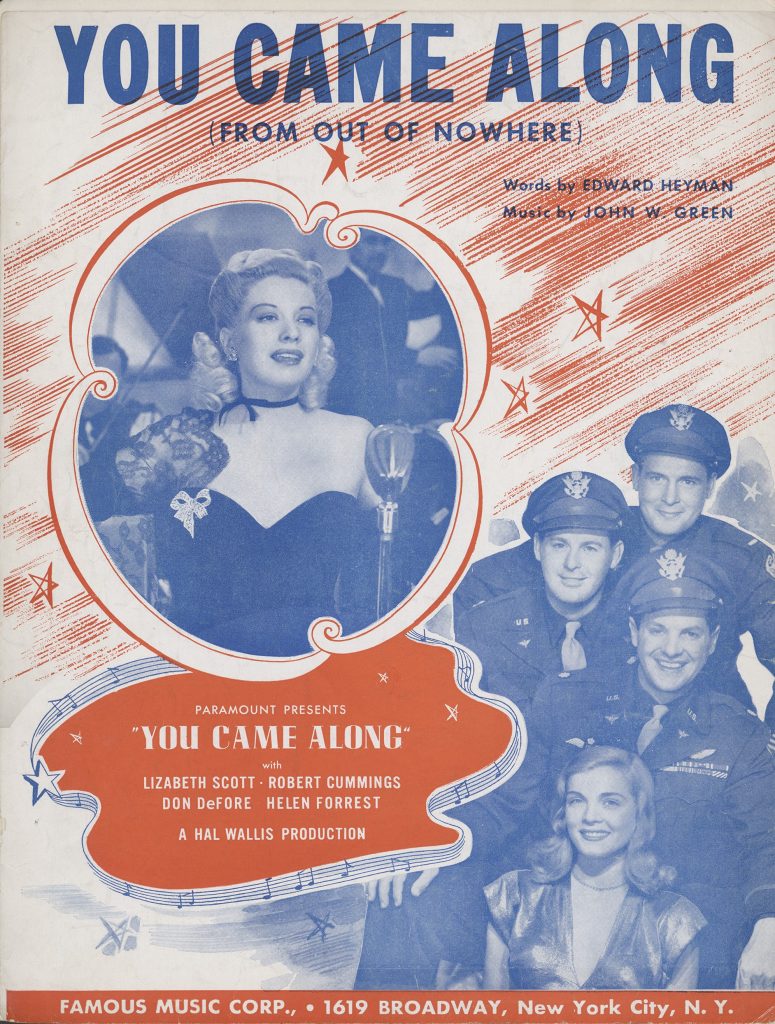
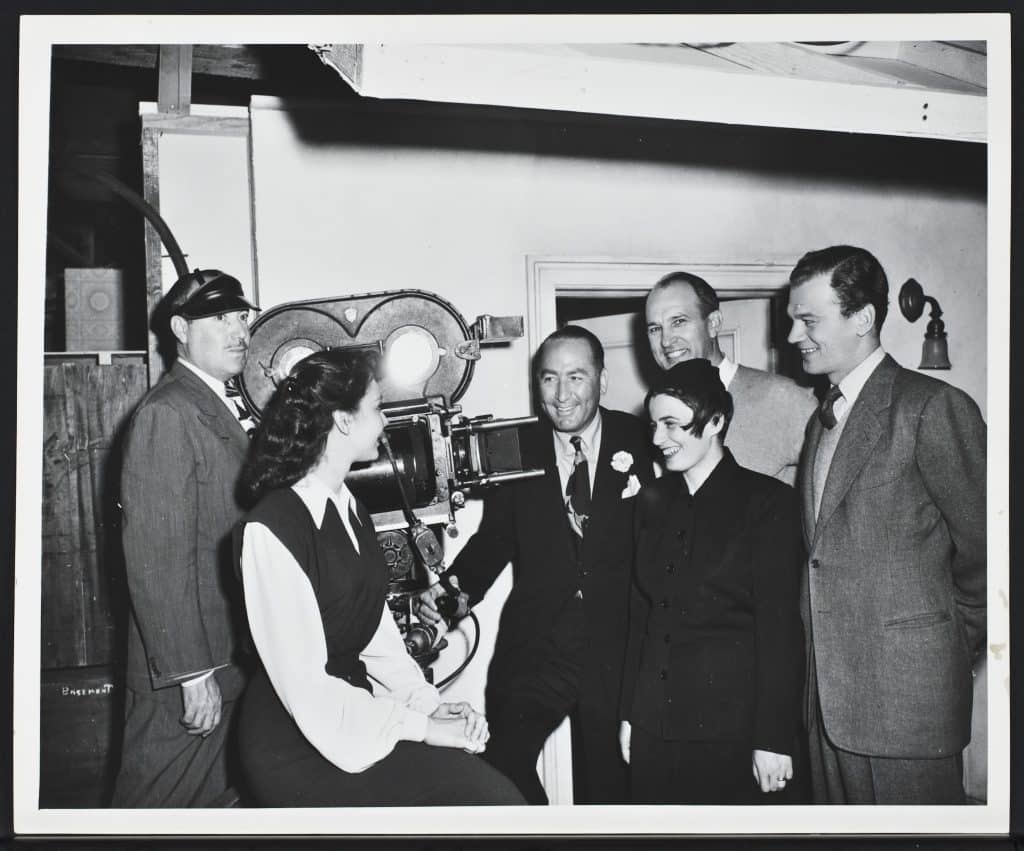
PHOTOGRAPH
1945
Ayn Rand on the set of Love Letters with cameraman Lee Garmes, lead actress Jennifer Jones, producer Hal Wallis, director William Dieterle, and lead actor Joseph Cotton
40-117
Ayn Rand Photograph Collection
Ayn Rand Archives
CLIPPING
1945
Magazine clipping from Daily Variety featuring an advertisement for the 1945 film Love Letters
007_13x_012
Ayn Rand Papers
Ayn Rand Archives
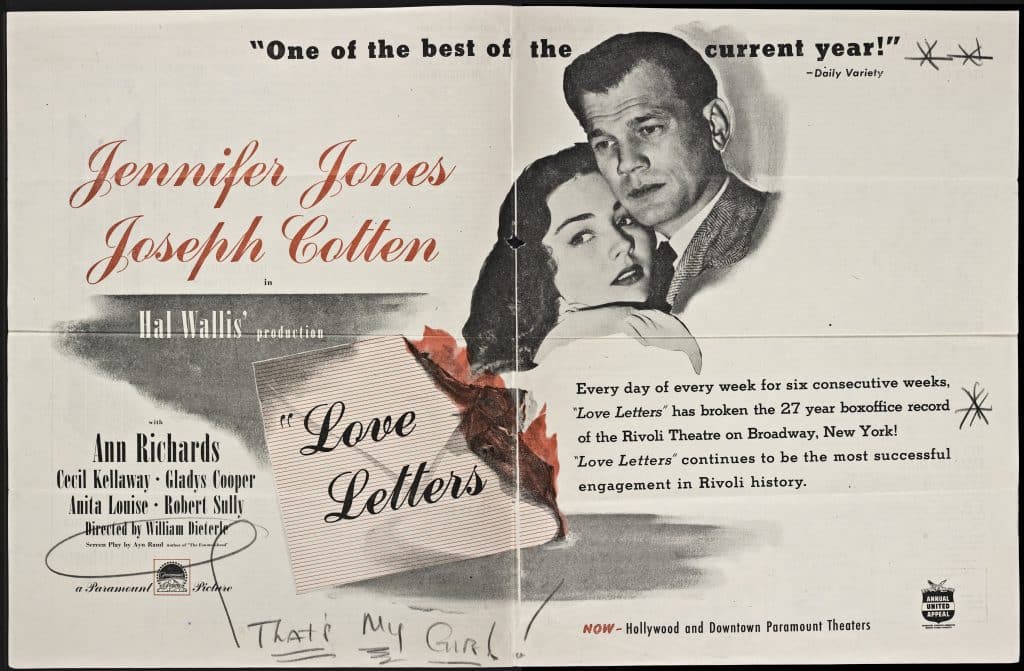
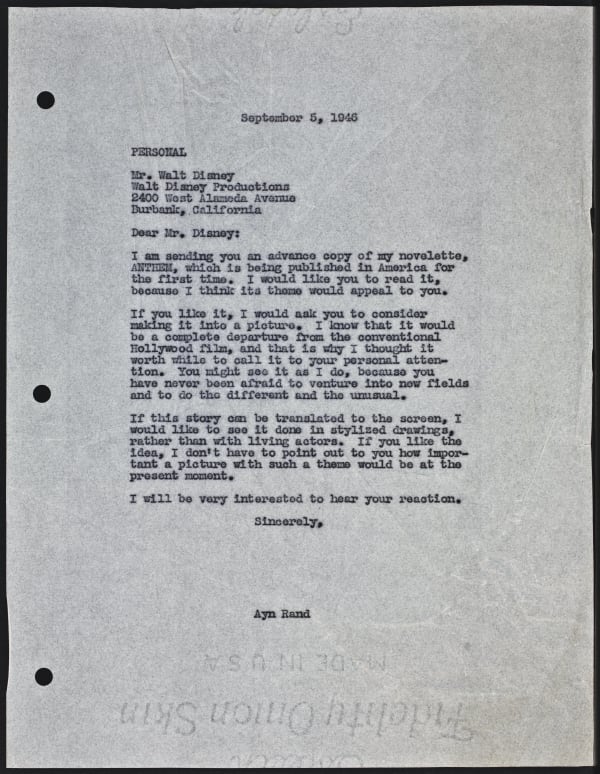
LETTER FROM AYN RAND TO WALT DISNEY
September 5, 1946
Ayn Rand’s dystopian novella Anthem was originally published in England in 1938 and wasn’t published in America until eight years later in 1946. Rand sent an advance copy of the book to Walt Disney, inquiring whether he would be interested in adapting it into an animated film. There is no documented evidence that Disney responded to Rand’s letter.
This letter (#261) is also available online in the Letters of Ayn Rand online exhibit.
100_12A_027
Ayn Rand Papers
Ayn Rand Archives
PHOTOGRAPH
1947
Von Sternberg House Interior
Photograph by Julius Shulman
Ayn Rand Photograph Collection
Ayn Rand Archives
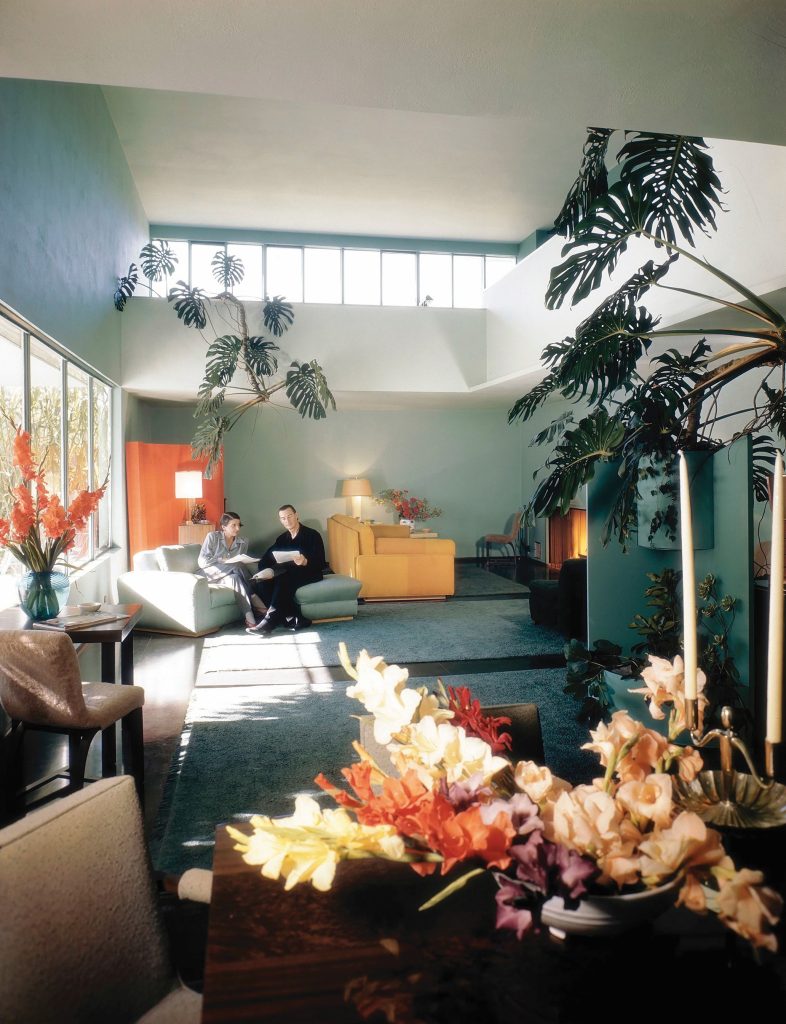
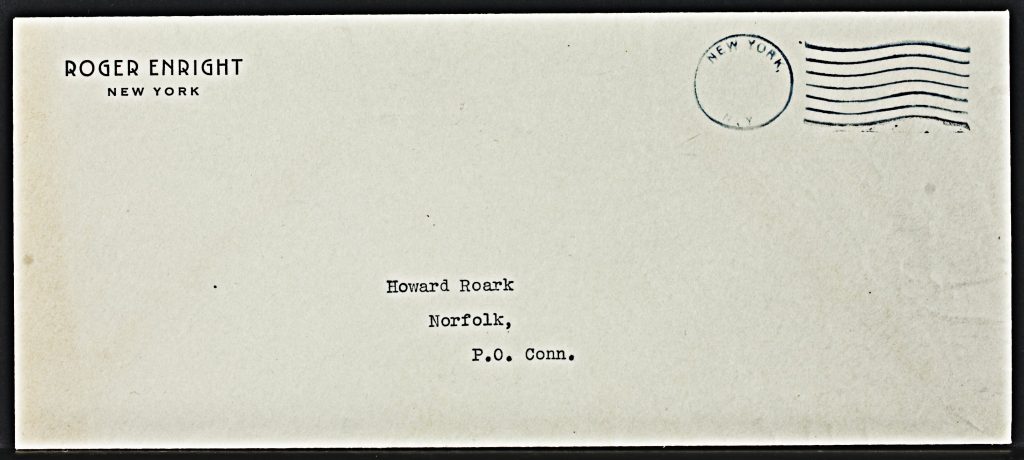
MOVIE PROP
ca. 1948
A movie prop used in the 1949 film The Fountainhead; an envelope addressed to Howard Roark from Roger Enright
093_17x_001
Ayn Rand Papers
Ayn Rand Archives
PHOTOGRAPH
ca. 1948
Ayn Rand on the set of The Fountainhead with Gary Cooper and Patricia Neal
Photograph by Jack Woods
40-172B
Ayn Rand Photograph Collection
Ayn Rand Archives
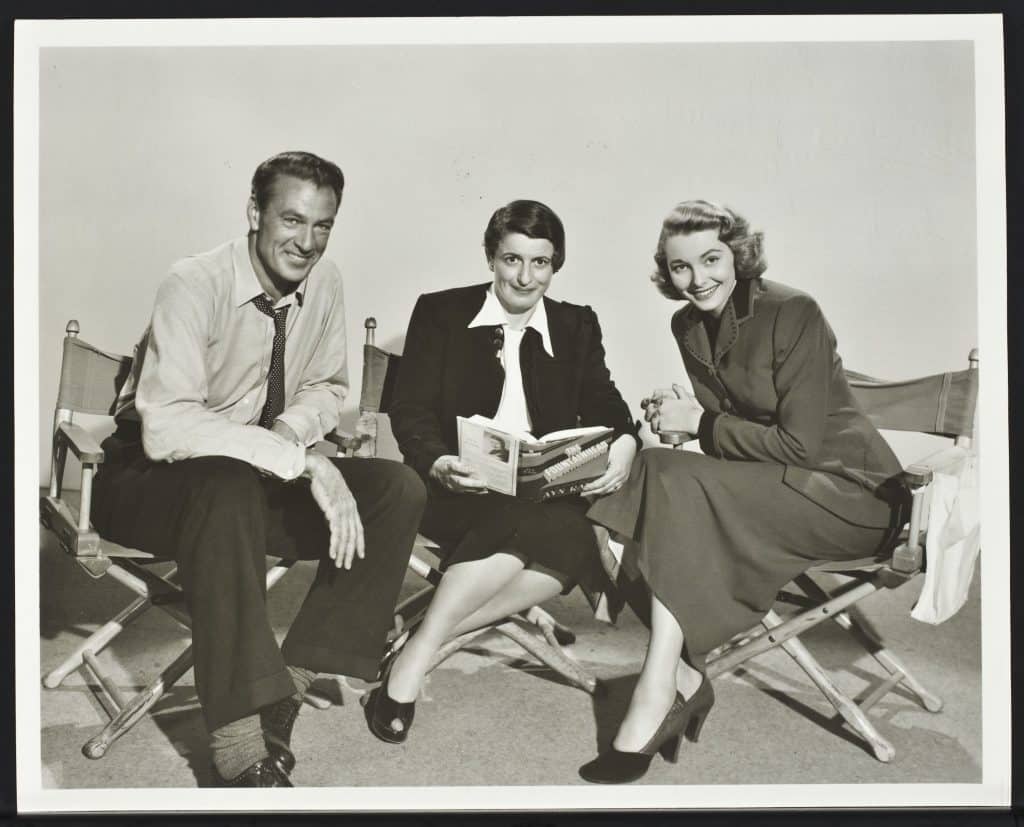
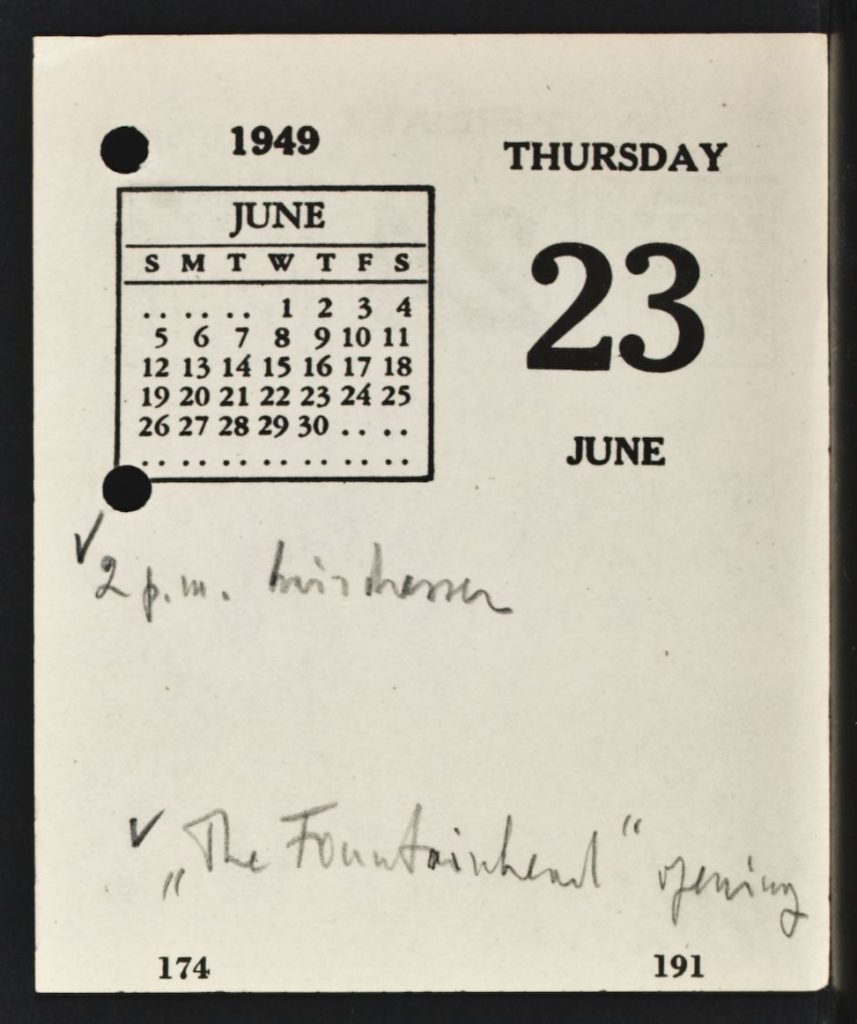
DESK CALENDAR
1949
Ayn Rand’s 1949 desk calendar featuring the date she attended the premiere of The Fountainhead movie
175_03x_001
Ayn Rand Papers
Ayn Rand Archives
Shortly after the publication of Atlas Shrugged in 1957, Ayn Rand stated (in biographical interviews now housed in the Ayn Rand Archives) that the novel “could make an excellent movie.” For nearly the next two decades, Rand worked to adapt her magnum opus as a motion picture.
In 1972, Al Ruddy (best known as the producer of The Godfather) expressed interest in acquiring the rights to Atlas Shrugged, but they failed to reach an agreement when Ruddy refused to grant Rand final approval of the screenplay. A few years later, an agreement with NBC was signed for an Atlas Shrugged television miniseries, but the production failed to proceed. By the 1980s, Rand was planning a return to Hollywood, intending to write and produce her own adaptation of the novel. Unfortunately, her screenplay for Atlas Shrugged was unfinished at the time of her death in 1982.
To learn more about Ayn Rand’s efforts to adapt Atlas Shrugged as a motion picture, readers are invited to consult this article by Jeff Britting.
NOTES ON CASTING
August 21, 1978
Ayn Rand’s notes on casting for a potential Atlas Shrugged film or television adaptation
055_07x_001
Ayn Rand Papers
Ayn Rand Archives
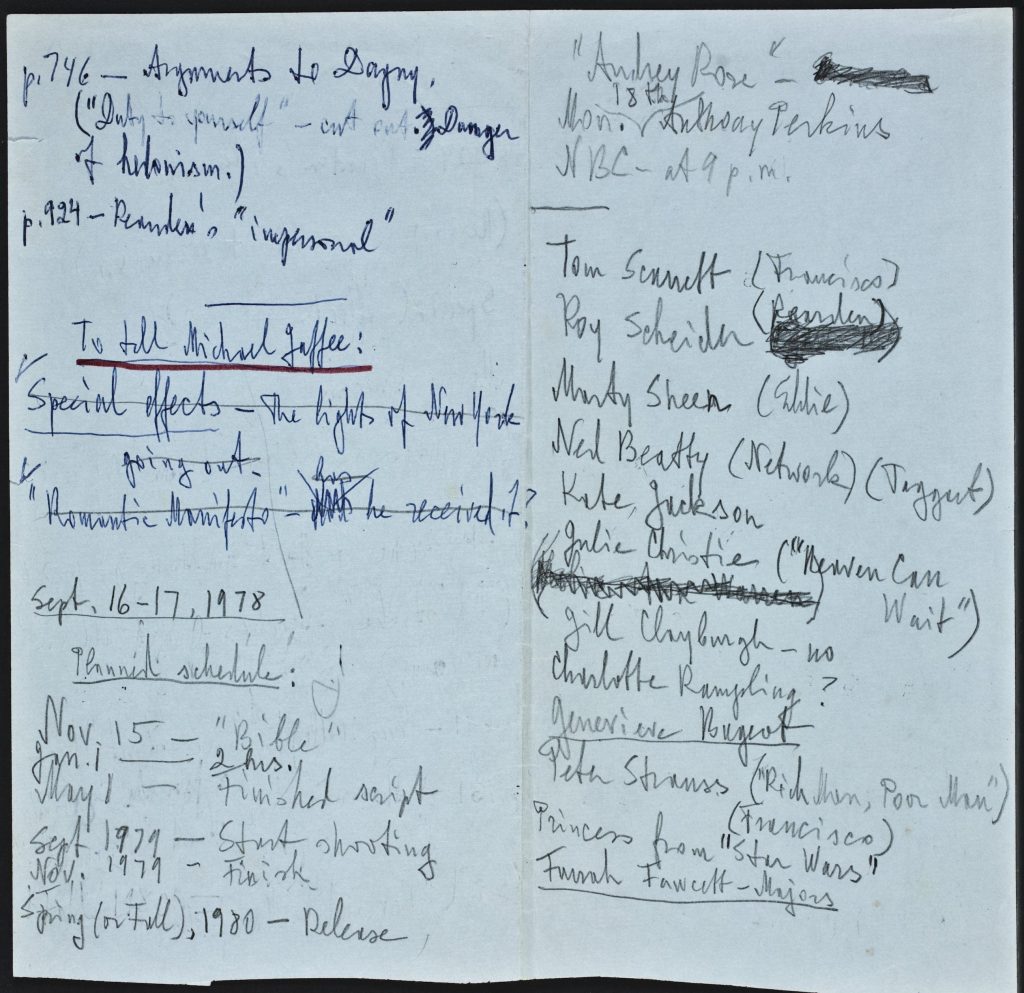
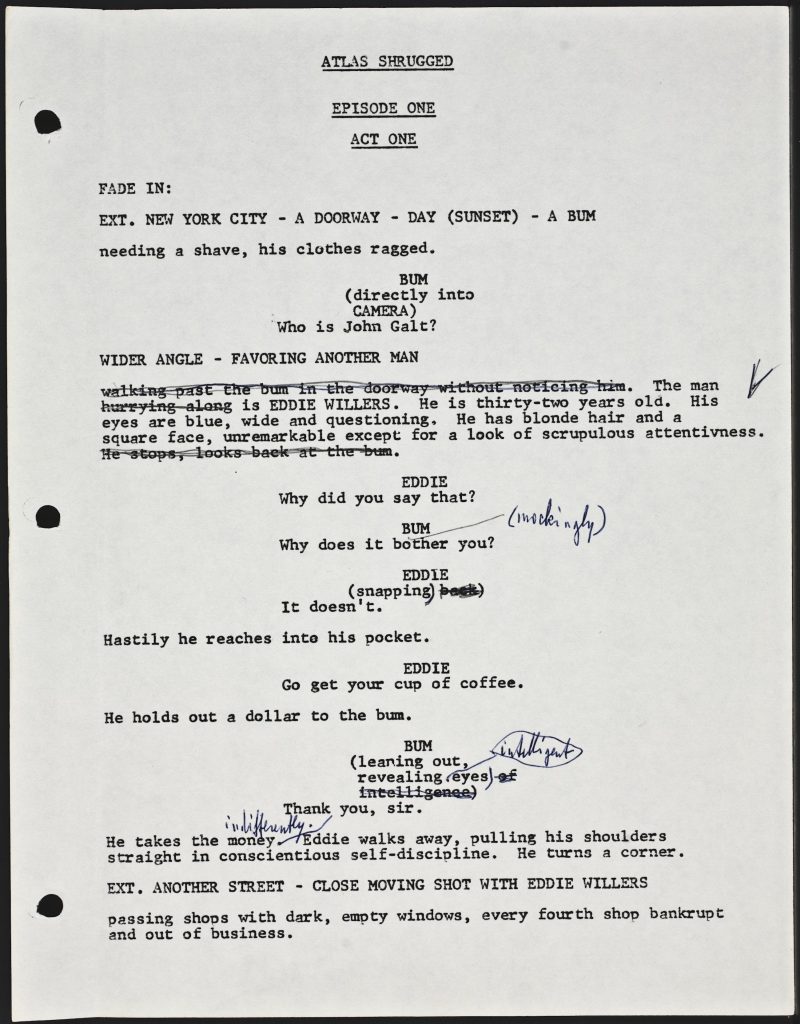
TELEPLAY
March 7, 1979
The first page of Atlas Shrugged teleplay by Stirling Silliphant, featuring handwritten comments and revisions by Ayn Rand
054_03x_001
Ayn Rand Papers
Ayn Rand Archives
CHAPTER OUTLINE
ca. 1981–1982
Ayn Rand’s annotated chapter outline for a potential adaptation of Atlas Shrugged
171_06x_004
Ayn Rand Papers
Ayn Rand Archives
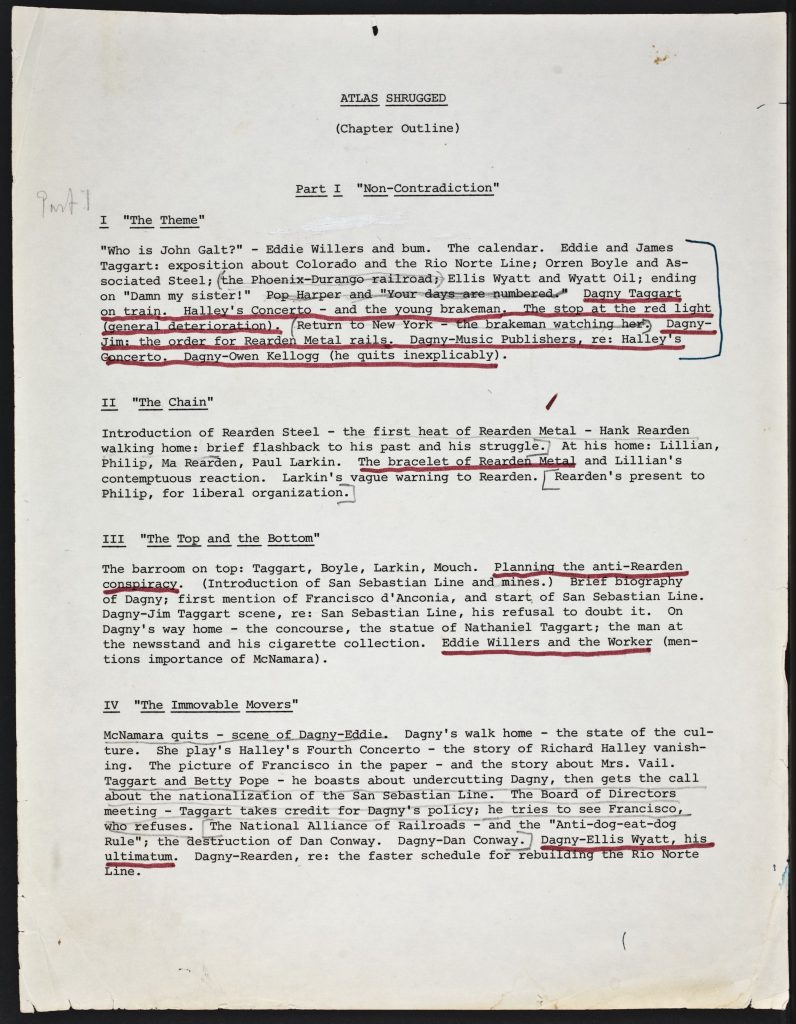
Following the publication of her magnum opus, Atlas Shrugged, Ayn Rand reoriented her career to become a public intellectual, appearing on television, radio, and other media to promote her ideas. During the Archives panel at OCON 2024, we released the audio of the “lost” second interview between Rand and Mike Wallace. The interview, along with a “behind-the-scenes” video, are now available on our YouTube channel. Watch them here:
To view Ayn Rand’s correspondence with U.S. Senator Barry Goldwater that resulted from this interview, readers are invited to view this entry in the “Letters of Ayn Rand” online exhibit.
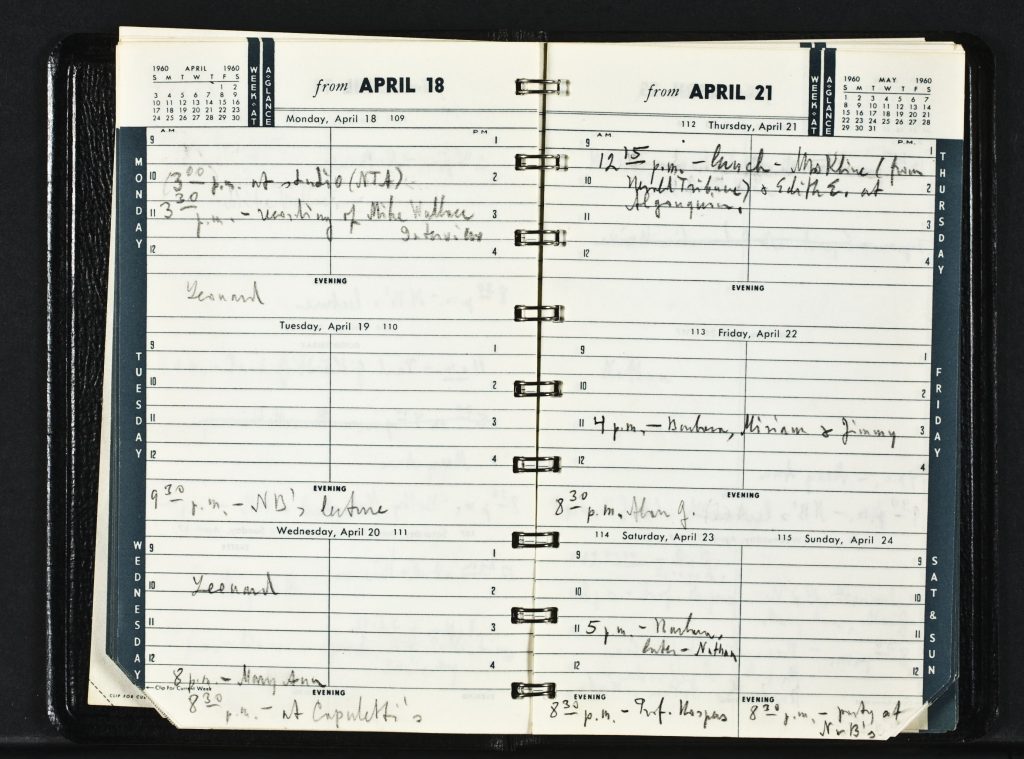
CALENDAR
1961
Ayn Rand’s Week-at-a-Glance spiral notebook calendar, 1960, featuring the filming date of Rand’s second television interview with Mike Wallace (top left)
179_01X_001
Ayn Rand Papers
Ayn Rand Archives
Berliner, Mike, ed. Letters of Ayn Rand. 2nd, online ed. Ayn Rand Institute, 2022.
Britting, Jeff. “Adapting Anthem: Projects That Were and Might Have Been.” New Ideal, February 29, 2024.
Britting, Jeff. “Adapting Atlas Shrugged to Film.” New Ideal, January 29, 2024.
Britting, Jeff. “Adapting The Fountainhead to Film.” New Ideal, November 22, 2023.
Britting, Jeff. “Adapting We the Living.” New Ideal, April 4, 2024.
Journo, Elan and Shoshana Milgram. “The Dramatic Story Behind the Making of The Fountainhead Movie.” Recorded in 2019 by the Ayn Rand Institute.
Lisi, Brandon. “Ayn Rand and ‘the Skyscraper.’” New Ideal, April 17, 2024.
Lisi, Brandon. “Rand and Oppenheimer: The Atomic Bomb Movie That Wasn’t.” New Ideal, October 21, 2023.
Lisi, Brandon. “We the Living on Broadway: The Story of The Unconquered.” New Ideal, November 8, 2023.
Milgram, Shoshana. “Ayn Rand’s The Fountainhead: The Story of Her Original Screenplay.” Recorded in 2022 by the Ayn Rand Institute in Washington, D.C.
Rand, Ayn. Biographical interviews by Barbara Branden, 1960-1961.
Scott, Duncan. “We the Living: Celebrating the Film’s 80-Year Journey.” Recorded in 2022 by the Ayn Rand Institute in Washington, D.C.
Curators: Brandon Lisi, Audra Hilse
Exhibit Design: Jeff Britting
Graphic Design: Simon Federman
Proofreading: Donna Montrezza
Editorial Assistance: Elan Journo
SPECIAL THANKS
Leonard Peikoff
Ray Shelton
Donors of the Ayn Rand Institute
Produced by the Ayn Rand Archives
A Special Department of the Ayn Rand Institute

Copyright © 1985 – 2025 The Ayn Rand Institute (ARI). Reproduction of content and images in whole or in part is prohibited. All rights reserved. ARI is a 501(c)(3) nonprofit organization based in the United States. Contributions to ARI in the United States are tax-exempt to the extent provided by law. Objectivist Conferences (OCON), Ayn Rand Conference (AynRandCon), ARU and the Ayn Rand Institute eStore are operated by ARI. Payments to OCON, AynRandCon, ARU or the Ayn Rand Institute eStore do not qualify as tax-deductible contributions to the Ayn Rand Institute. AYN RAND, AYN RAND INSTITUTE, ARI and the AYN RAND device are trademarks of the Ayn Rand Institute registered in the United States and other jurisdictions where applicable. All rights reserved.